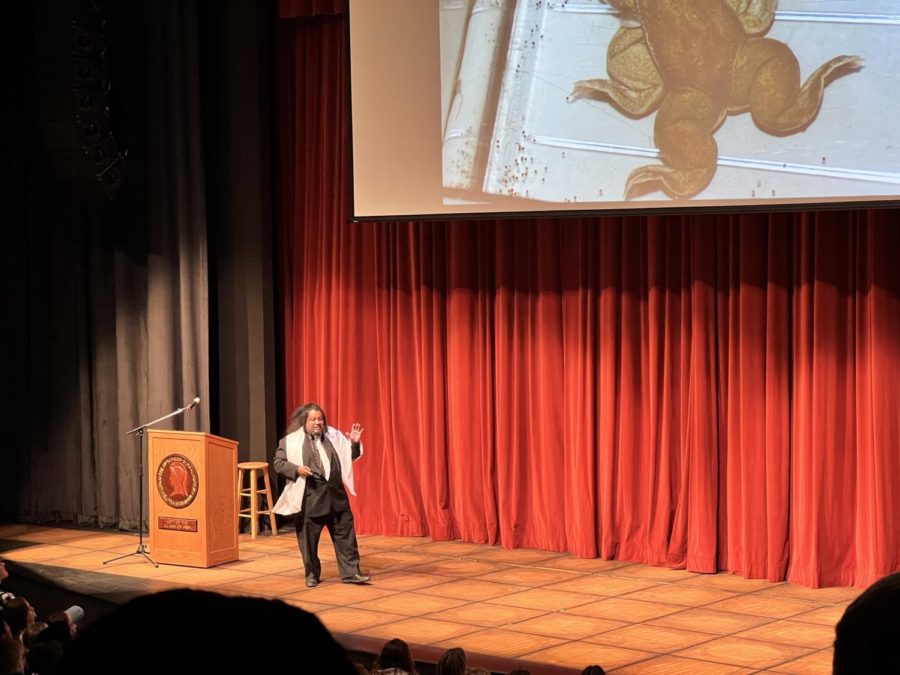In Beal Lecture, Dr. Tyrone Hayes Delivers Call to Action on Atrazine Use
Dr. Tyrone Hayes speaks at the all-school Beal Lecture.
Dr. Tyrone Hayes, an endocrinologist at the University of California at Berkeley, delivered a stirring presentation about his research on atrazine in Walker Auditorium on Thursday, representing the school’s first Beal Lecture since the Covid-19 pandemic interrupted the tradition in 2019.
In his one-hour lecture, Dr. Hayes touched on concepts of endocrine disruption, environmental justice, and accessibility of scientific research, lacing them together with humorous remarks and an autobiographical account of his experience in research.
Specifically, the presentation centered around his research on the effect of atrazine, which is a commonly used herbicide in the agricultural industry, on the African clawed frog. Dr. Hayes discovered that very low concentrations of atrazine could turn males of this species into hermaphrodites. Sperm levels in the males saw drastic reductions as the testes became filled with eggs.
Dr. Hayes — whose work has been published twice in The Proceedings of the National Academy of Sciences and once in Nature — criticized the Environmental Protection Agency and Syngenta, who manufactures atrazine, for their failure to act on the findings.
“I would guess that a dozen chicken eggs popping out of my testicles would have to be at least in the top five most painful experiences. The E.P.A. doesn’t think so,” he said during the lecture, referring to male frogs that had eggs growing on their testes after exposure to tetrazine.
The effects of Atrazine might not be limited to frogs and rats, according to Dr. Hayes. “Men in Columbia, Missouri, who have [more] atrazine in their urine have a lower sperm count,” he said. “I started to think that this agricultural runoff might not only affect the frogs and the fish, but the other animals who are drinking from the water, including humans.”
He shared data that indicated that farm workers whose job it was to apply atrazine had 2,400 times more of the chemical in their urine than in the frogs he experimented on. “90% of the workers are Latinx,” he said, touching on a theme of environmental justice. “The people who make [California] the fifth largest economy in the world are paying the cost that the E.P.A. is talking about.”
Dr. Hayes, who repeatedly described himself on stage as ‘just a boy who likes frogs,’ lamented the lack of awareness about scientific research like his own, a problem he says stems from inaccessibility of research. “We’re being promoted and rewarded for publishing things in an ivory tower that the public doesn’t have access to,” he said.
He closed with a quote from Albert Einstein: “Those who have the privilege to know, have the duty to act,” calling on students to spread awareness about the cause. “You have a duty,” said Dr. Hayes. “And I reason that we can change the paths, but only if we act now, while it is still the future.”
This is a breaking story. More information will be added soon.






